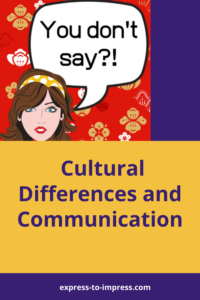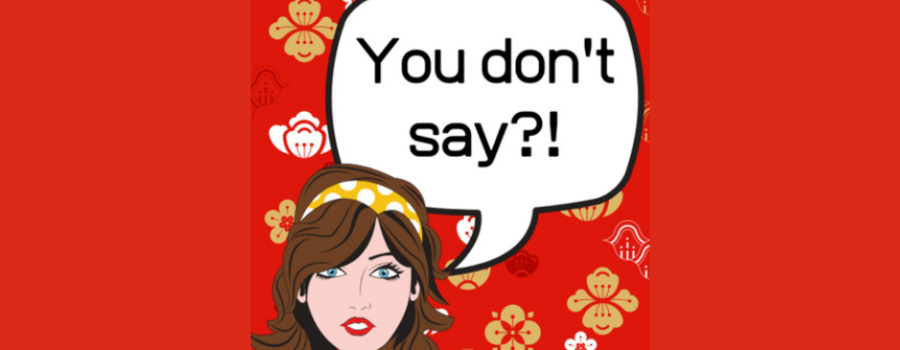Introduction
Hello! It’s Kristine here with the Express to Impress podcast. Today, I’m excited to share a conversation I had this week with Audrey and Abigail, the delightful hosts of the You Don’t Say?! English Podcast. You may remember hearing about their podcast in the episode, How to Learn a New Language. I love their podcast and recommend it to anyone curious about culture, language, and language learning.
Can’t Read Now? Pin it for later!

The You Don’t Say?! English Podcast helps language learners build communication skills by listening to real-life, spontaneous conversations in English. And that’s what we had – a real-life conversation about cultural differences and their impact on communication, especially in interviews and the workplace. You’ll also learn more about my background. I tell a story about a time I faced a big cultural shock and talk about some of the countries where I’ve lived and visited.
If you have an interview coming up, I invite you to visit my website for my free five-step job interview preparation checklist. This checklist has helped thousands of people worldwide perform well in interviews and get jobs they love. To sign up, visit my website at express-to-impress.com.
And a quick reminder that you can subscribe to receive notifications whenever I release a new episode. You can subscribe on Apple Podcasts and all other major podcast directories.
Now, here is my conversation with Audrey and Abigail!
Cultural Differences and Communication Conversation
Audrey:
Hi everybody. And welcome to episode 48 of the podcast You Don’t Say?!, and today is our guest interview episode. We have Kristine from Express to Impress. Welcome, Kristine.
Kristine:
Thank you! I’m so happy to be here.
The Express to Impress Podcast
Audrey:
So I asked Kristine to come and talk to us today because I’ve been following her podcast, which I really think is great for not necessarily only English learners, but lots of people who want to have great CVs and prepare themselves for job interviews. But on the other hand to really improve their business communication skills. And also, Kristine has a wonderful experience living in different countries and experiencing different cultures. So I thought we could definitely have a good conversation. So let’s get started.
Kristine’s Experience In Different Countries
Abigail:
Kristine, I’m curious because I didn’t know you’d lived in different countries. Which countries have you lived in?
Kristine:
Sure! So I haven’t lived in countries for years, but I have lived in different countries for months, which has been a really fun experience. I’ve been in San Jose, Costa Rica and Guadalajara, Mexico, spent quite a bit of time in Canada and in France. And then most recently in Brazil.
Audrey:
That’s pretty impressive, hey.
Kristine:
You never know where life is going to take you!
Audrey:
Yeah, yeah. Every four weeks, we do a country spotlight, and we talk about a different country, and we’re like, oh, could we live there for like a period of time? You’re a bit like that. You’ve lived in different places.
Working Online and Kristine’s Line of Work
Kristine:
And so teaching online, working online, it really opens up some possibilities. So, I’ve really capitalized on that and enjoy working abroad.
Audrey:
So, tell us a little bit about what you do now– your business and podcast.
Kristine:
Sure. So I help people communicate in English effectively, and I specialize in working with non-native English speakers. So I have a background in teaching English. I also have a business background, so I’ve kind of combined those areas. So I help people speak in English effectively within their environment, within the different cultures they work with.
So I help people get ready for interviews. That’s the main thing I do. And a lot of that communication training is very helpful for once they get the job, and they are interacting with their colleagues and need to be able to introduce their ideas clearly and concisely, for example, if they’re working with an American audience. I work with many of them once they get the job and they get started, and they have some self-doubts they’re struggling in an international environment. And I help them prepare for those important speaking points in meetings or presentations. So yeah, I have some really ambitious students and clients, and I just try to support them how I can.
Understanding the American Culture
Audrey:
So obviously, you try to help people to understand the American culture. Yeah? So where do you start when you’re with someone from a different country and you want to kind of help them understand the American way of doing business, maybe the corporate culture. Where do you start with something like that?
The Culture Map
Kristine:
Sure. So, and I will say that while many of my clients want to work for American companies in the US or abroad, I also have clients who are working in the Netherlands with an international team, and there’s no American present. So my advice for anyone working with other cultures is to observe, listen, and speak less.
At the very beginning, you really want to take notice of what’s happening in your environment, how things are done, how decisions are made, how people interact with people at different like hierarchy levels, how people share their ideas, how trust is built, how criticism is shared, because there are some very big cultural differences, even between different cultures that seem quite similar.
Observing is one of the best things I suggest. And then I always recommend the book “The Culture Map.” I have it here.
Erin Meyer does such a fantastic job of mapping out the different ways people from different cultures approach these different areas of communication in business. And it’s such a helpful tool for preparing for working in a different cultural environment.
Audrey:
Yesterday, I was showing an interview with her where she talks a bit about her book to a student. Because she manages a global team, and possibly she’s going to have to add other countries on as well. So, it really just even her main point that she talks about what was really helpful for her. I think she mentioned the way of listening and the way of interacting in the meeting, like how it should wait to interrupt in different cultures. Just one thing like that can be really valuable.
Kristine:
Yeah, absolutely. Yeah. She has so many great tools and suggestions. She also points out that there are basically massive misunderstandings happening constantly. So even when you learn the English language, learning how to use it within these different cultures that they’re working with is, is important to their success and important to their happiness. So it’s, it’s, it’s a wonderful tool, and I try to translate some of that for my clients and students.
Abigail:
So, you’ve been saying that also you work with people that are looking to prepare for job interviews. So what kind of advice do you usually give people when they are preparing for interviews?
Understanding The Company or The Program
Kristine:
Sure. So, you know, it’s, these are very important moments in people’s lives, and it is usually highly competitive to get whatever position that they’re going after. So I work with job seekers. I also work with a lot of doctors who want to get accepted to residencies and fellowships in the US. And so they will invest an enormous amount of time and money before they ever meet with me to get ready for an interview, and the stakes are high. And so I suggest, you know, looking at it like a research project. You want to understand the company or the program really well. And you want to know what your job responsibilities will be like the back of your hand. So really understanding that job description and really well, and then understanding what you need help with.
So if a person knows, like I’m not a great speaker, I’m introverted, I get very nervous during these moments. They’re going to want to spend more time preparing on their own and working with a coach. If it’s somebody who is quite good at interviewing and they feel comfortable speaking and talking about their accomplishments. They have a great memory, and can remember all sorts of stories from the past, which many of us don’t, it’s very hard when you’re asked on the spot to share those stories. But for people who are already pretty good at interviewing, but they’re not getting, you know, offers, and they know there’s something wrong. Even just a couple of sessions with a coach can be helpful because they will point out things that it’s impossible to know yourself.
You know, we all have our blind spots. So just a couple of sessions can be very helpful–one where the coach points out all of these things happening with communication or with the content of the answers–and then they get another chance to meet and implement what they’ve learned. But I work with some people who invest an enormous amount of time preparing for these opportunities of a lifetime. They might meet with me ten times, you know, getting ready for, these series of interviews that they have coming up.
I have a checklist, a five-step checklist that walks them through the process to get prepared. I have an online course, so everyone who works with me gets access to that online course. So that combination of learning about the process, learning all about body language, what makes a great answer, what’s the appropriate length for an answer, and then getting the chance to practice that before the real deal helps people be more successful.
Audrey:
Wow. It must be really satisfying to be able to help people that way. No?
Kristine:
Absolutely. Yeah. I’m inspired by the people I work with for sure. They really put themselves out there, and I just try to, you know, help them continue to improve and learn through the process. But they’re the ones doing the hard work.
Success Stories
Audrey:
Yeah. And so, what would be like one of your favorite success stories?
Kristine:
I had a client from Brazil working in France, and his wife had already got a job in Miami. And so he was applying and interviewing for a job in Miami, and the stakes were high. He wanted to reunite with his wife. Working with him and seeing him get a job offer after working together was really satisfying because it meant he got to leave France and go to America and start his life with his wife. So that was very satisfying.
Cultural Shock
Audrey:
Yeah. Yeah. That must be wonderful. Great. So, having different exposures to different cultures yourself, what’s been a big culture shock for you in your life?
Kristine:
Yes. So, you might be surprised that this happened when I visited England.
Audrey:
No. These things are the most obvious, like, you know, where the culture seems similar. You think you know the culture.
Cultural Differences between England and the US
Kristine:
These subtle differences can make such a big difference! Well, I was young. I was at a university, and I wanted to travel to England to visit one of my friends who was studying abroad there. And I was definitely an experienced traveler. I started off the trip by going to the wrong city. The students in the program were in a program called Oxbridge, which is this combination of like, some of them were in Oxford; some of them were in Cambridge. So you know, I’d been on a long flight overnight. I arrive and say, “I need to go to say Cambridge.” Well, I was supposed to go to Oxford and, you know, I realized this trip is taking too long.
And I get there, and I have to find my way back to Oxford. And I was completely ill-equipped. I won’t even go into how ill-equipped I was, but I will say I was carrying around 50-pound luggage, you know, with me. And I had never used public transportation. It’s not very common in the Midwest. And I was by myself, and I could not figure out that bus schedule for the life of me.
And the most surprising thing was when I asked people for help, I could not understand what they were saying to me. I was looking for a yes or no. “WILL THIS BUS TAKE ME TO OXFORD?” And they would just start talking so fast. I just was looking at them, and I couldn’t believe I couldn’t understand the English that they were saying. I felt really silly, I felt dumb, I felt like I can’t believe I can’t figure this out.
And I started to feel a sense of defeat, and I missed bus after bus to Oxford and eventually this little old lady from, I don’t remember what country she was from, but she wasn’t from England, she noticed I was having troubles. She brought me a warm scone, she brought me hot tea and escorted me onto the last bus to Oxford of the day. It was such a welcoming presence at that moment, and I eventually got more accustomed to the accent, but it took almost a week for me to really be able to communicate effectively. And it was so fun, but I was just shocked by how different the accents were.
Communicating With People With A Different Accent
Abigail:
You’re not the first American that I’ve heard say that. The accent or just some of the vocabulary that we use as well. It’s strange.
Audrey:
No. And you think you know the vocabulary differences, but it’s not always so clear. I had the same going into the US as well like just sometimes being confused about like going to the pet, like to get gas, I should say the Petro station, but like, you know, you want gas, or asking questions that I didn’t know exactly what they wanted, so you’re not alone.
Kristine:
Changes in vocabulary to make a difference. Yeah. And some of them, they are just, oh, that’s interesting. You know, but you don’t have to know. So I remember, I had held the door open, and somebody said, “cheers.” And I was like, “huh.” Well, I would say cheers but not use it in any other context. So it was more of a fun discovery, but the challenge is when you need to understand, you know, that vocabulary so that yeah, you can make it to the gas station or you can get on a bus to go to another city.
The Asian Culture
Audrey:
Wow. Yeah, that’s crazy. At the moment, I’m working with a student just about to start a project with Indians. She has to manage them, and they’re developing software for the company, and she hasn’t actually thought about the Indian culture yet. So I’ve been starting to show her some articles and talk about what could be some of the challenges. Have you got an example exactly where maybe, yeah, someone didn’t realize something was happening, but then with cultural training, you are able to help them be more effective in their job?
Kristine:
Yeah. Let me think about an example here. So I would say this is a small thing, but in many Asian cultures, the focus is on speaking and listening. Whereas with American English, the speaker bears the responsibility for good communication. But in many Asian cultures, the communication style is more sophisticated, nuanced, and you need to be able to read between the lines. And so for many of the Korean or Chinese or Japanese doctors that I work with, I have to really work with them to completely change their communication style so that they are answering in a more direct way instead of kind of this roundabout way where a good listener could gather the lesson that they’re sharing or the point that they’re making.
I also work with them on pausing where they actually pause, some of my clients pause more than Americans, and Americans are not always the best listeners. We’re not the most patient. So now I advise that you let the person know you’re going to be thinking. “Great question; I just need a moment to gather my thoughts.” And take some time to think. But it is more normal in Asia to have these pauses. But unfortunately, if they’re interviewing with an American, the American is going to interrupt them. They might perceive it as a lack of confidence. It could damage the communication that’s happening. And it’s simply a difference in cultural communication style. So those are a couple of the things that I’ve worked with clients in.
Cultural Differences And Feedback
Audrey:
So that’s nice, like a little tip. I would normally pause and think and silence is okay, but exactly to sort of find a middle ground between the American and the Asian way. Just let me think about that. Or maybe buy time. “Oh, that’s a good question; just let me think.” Sort of find a bridge between the two. Yeah.
Kristine:
And that’s what a lot of it is recognizing there’s a difference and then finding that bridge. Another thing I suggest is explaining what you’re doing because even though it may seem obvious, if you are giving negative feedback to somebody from a different culture, that’s an area where there’s big differences in how negative feedback is given. And it’s very surprising to people how Americans give negative feedback, because normally we communicate directly, clearly, almost in bullet form sometimes. But when it comes to giving feedback, we’re very cautious.
Audrey:
Too diplomatic, maybe?
The American “Diplomacy”
Kristine:
Yeah. We’re more diplomatic, and that leads to uncertainty for some people. They want to know, like, have I messed up? Do I need to do something better? Because my boss just gave me two compliments and only one slight criticism. In that case, I would suggest that the person, when they’re giving feedback to let the person know what they’re doing. “You know, I’m going to give you some constructive feedback. I’m going to give you some coaching. I’ll also let you know what you’re doing well.” Then the person walks away with an understanding that that was an unusual way of receiving feedback or criticism, but that’s what the intent was.
Audrey:
Nice. So Abby, do you have any other questions?
Abigail:
I do think so.
Kristine’s Next Steps
Audrey:
I guess my last thing is really like, where next are you going to go? Where are you planning to travel to, if anywhere? I don’t know. I mean, it’s a bit hard at the moment.
Kristine:
Well, I loved my time in Brazil. I spent almost seven months there, I had intended to travel worldwide, I had all these places in Europe I was going to visit, but when I arrived in Brazil, it was at the start of the Coronavirus. And so I ended up staying there because of all the orders closed, all my plans got canceled. So I really fell in love with the language, and I envision myself going back. So right now, I’m working on my Portuguese. I have a language exchange partner, and I want to go back and see my friends and, you know, speak with them in more Portuguese than I could when I was there last year.
Audrey:
So, I mean, you’ve got time to get ready, and probably you won’t be moving there yet, but no, that sounds great. So where would you like to go in Brazil?
Kristine:
So a place called Vila Velha. It’s a place that’s very popular for volleyball. I play a lot of volleyball, and they have their Olympic athletes train here so you can watch some really top-level volleyball. Yeah, it’s a fun place, but a lot of it was shut down while I was there. So I didn’t get to see the full Brazilian culture. I want to go back and experience the music, experience more of the food and community there. We did a lot of communicating from our balconies actually because we were home a lot. I’d love to go back.
Audrey:
Wow. Sounds good. Okay. I think that’s it. Thank you.
Abigail:
Thank you, Kristine.
Kristine:
Thank you!
Tune in Next Week
That’s all for today! I hope you enjoyed learning about cultural differences and communication during my conversation with Audrey and Abigail. It was a lot of fun, and I can’t wait to have them on the Express to Impress podcast.
Thank you so much for listening to the Express to Impress podcast. If you found this episode helpful, please remember to share it with a friend! See you next time. Bye!
Music By Lucas Knutter





Leave a Reply
Your email is safe with me.